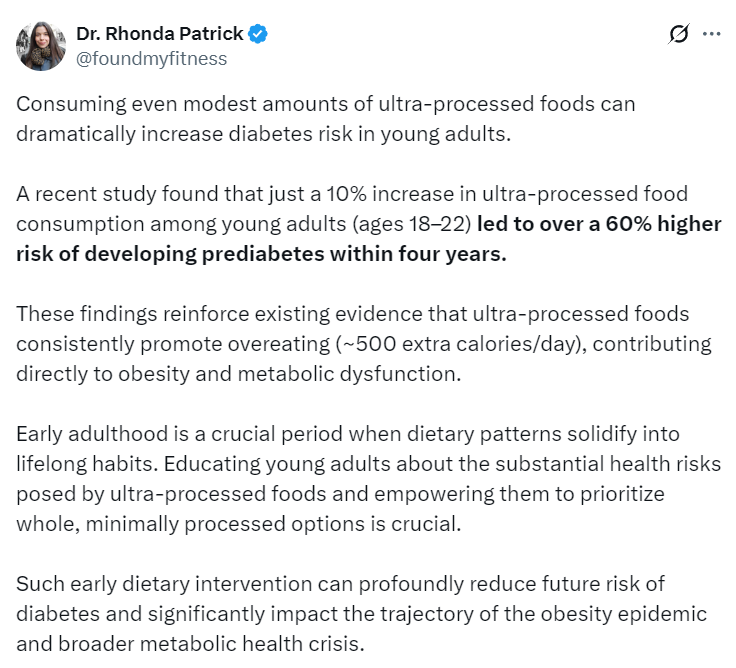A groundbreaking study has revealed an alarming connection between ultra-processed foods and the rapid development of prediabetes in young adults, prompting renewed calls from health experts to reconsider our relationship with convenience foods.
Dr. Rhonda Patrick, a prominent biomedical scientist, has drawn attention to research showing that even modest increases in ultra-processed food consumption can have dramatic consequences.
According to the study, when young adults between ages 18 and 22 increased their ultra-processed food intake by just 10 percentage points, they faced a staggering 64% higher risk of developing prediabetes within a mere four years.

The research, published by scientists from the University of Southern California and other institutions, followed 85 young adults enrolled in the Meta-AIR study between 2014 and 2022. Participants completed detailed dietary recalls and underwent oral glucose tolerance tests at multiple visits, allowing researchers to track how changes in eating patterns affected their metabolic health over time.
The findings paint a troubling picture of how quickly dietary choices can alter our bodies’ ability to regulate blood sugar. Beyond the prediabetes risk, the study found that a 10 percentage-point increase in ultra-processed food consumption was also associated with a 56% higher risk of impaired glucose tolerance. Even baseline consumption of these foods predicted elevated insulin levels years later, with significant increases in fasting insulin, two-hour insulin levels, and overall insulin response.
Ultra-processed foods—which include items like packaged snacks, sugary beverages, frozen meals, and many breakfast cereals—now constitute more than half of the total dietary energy consumption in the United States. These products are typically laden with sodium, sugar, and unhealthy fats, and their formulation appears to promote overconsumption in ways that whole foods do not.
Dr. Patrick emphasizes that existing evidence demonstrates ultra-processed foods consistently drive people to consume approximately 500 extra calories per day, directly fueling the obesity crisis and metabolic dysfunction that follows.
What makes these findings particularly concerning is the age group affected. Young adulthood represents a critical window when eating habits often solidify into lifelong patterns. The dietary choices made during these formative years can set the trajectory for decades of health—or disease—to come.
“Early adulthood is a crucial period when dietary patterns solidify into lifelong habits,” Dr. Patrick notes, stressing the importance of intervention at this stage. “Educating young adults about the substantial health risks posed by ultra-processed foods and empowering them to prioritize whole, minimally processed options is crucial.”
The implications extend far beyond individual health. With type 2 diabetes rates climbing and obesity reaching epidemic proportions, the researchers suggest that limiting ultra-processed food consumption could serve as a vital prevention strategy. Early dietary interventions during young adulthood may profoundly reduce future diabetes risk and could significantly alter the course of the broader metabolic health crisis facing modern society.
The convenience of ultra-processed foods comes with a steep price. By making conscious choices to embrace whole, minimally processed foods instead, young adults can protect themselves from a cascade of metabolic problems that might otherwise define their future health.


